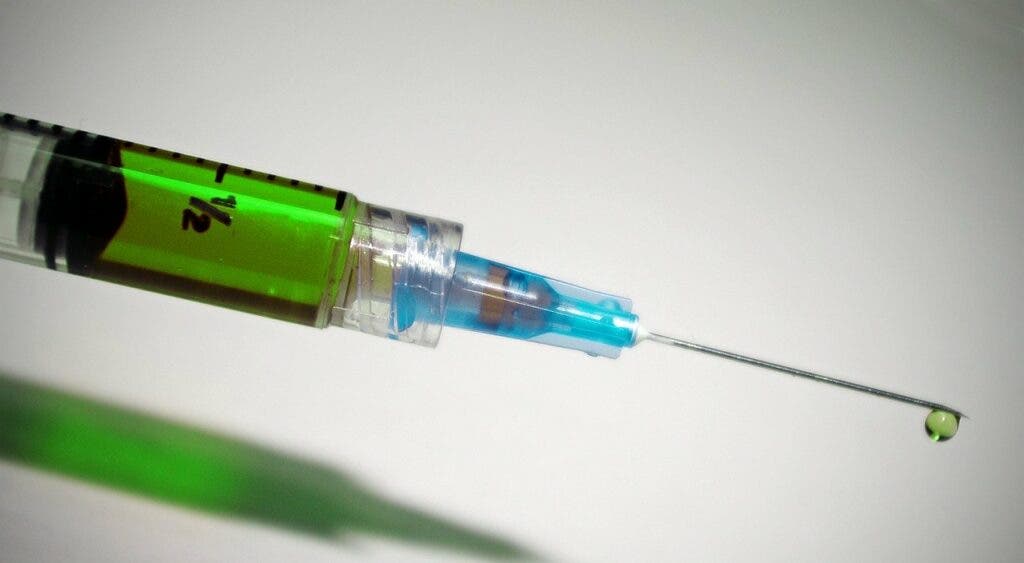
As the pandemic brings unprecedented economic damage to the world, most governments have funneled billions into accelerating vaccine development. Now, researchers at Oxford University’s Jenner Institute and pharmaceutical giant AstraZeneca have published preliminary results for the phase 1, single-blind, randomized controlled trial for a candidate vaccine — and the results have been extremely promising.
The hunt for a coronavirus vaccine is the ‘space race’ of our times
Researchers around the world are developing more than 160 vaccines against the coronavirus, 26 of which are undergoing human trials, meaning they’re beingly actively tested for both safety and efficacy.
Perhaps the most promising candidate out of the bunch is Oxford’s chimpanzee adenovirus-vectored vaccine (ChAdOx1 nCoV-19), which expresses the SARS-CoV-2 spike protein.
The vaccine was tested on healthy humans with no prior history of COVID-19 across five sites in the UK. A total of 1077 volunteers participated in the clinical trial between April 23 and May 21. Half received the ChAdOx1 vaccine, also known as AZD1222, while the other half were randomly assigned a meningococcal conjugate vaccine (MenACWY) as control.
All of the volunteers who received the vaccine developed neutralizing antibodies against COVID-19, according to the preliminary results published in The Lancet. However, those who received a single injection of the vaccine did not produce significantly more antibodies than persons who had recovered from COVID-19 infection. Ideally, you’d want more antibodies for enhanced protection.
So far, no vaccine has been tested to see whether or not it can prevent a coronavirus infection. It would be highly unethical to intentionally expose an inoculated person to the virus at this stage of research.
“In conclusion, ChAdOx1 nCoV-19 was safe, tolerated, and immunogenic, while reactogenicity was reduced with paracetamol. A single dose elicited both humoral and cellular responses against SARS-CoV-2, with a booster immunisation augmenting neutralising antibody titres. The preliminary results of this first-in-human clinical trial supported clinical development progression into ongoing phase 2 and 3 trials,” the authors of the study wrote.
The Oxford vaccine also produces a T cell response — a type of white blood cell that plays a critical role in the immune system by attacking cells infected by viruses.
Both the antibodies and T cell production were anticipated and designed into the vaccine.
“We hope this means the immune system will remember the virus, so that our vaccine will protect people for an extended period,” Andrew Pollard of the University of Oxford said in a statement.
The AZD1222 produced mild side effects, which resolved themselves over the course of the study
About 60% of the participants experienced side effects, including fever, headaches, muscle aches, and injection site reactions. These effects were mild or moderate, and all resolved themselves over the course of the study.
AZD1222 is already being tested in phase 3 clinical trial, the final and most important test for a vaccine. During this phase, the vaccine will be administered to thousands of people from various sites across the world. Researchers then follow up with these persons over time to see how many contract COVID-19 from their environments, compared with volunteers who received a placebo. These trials can determine if the vaccine protects against the coronavirus.
If all goes well, reviewers in each country approve the manufacturing or procurement of the vaccine. Typically, vaccine development and testing is a long and arduous process that takes about a decade to complete. However, the pandemic has greatly accelerated each phase of a vaccine’s development.
Hopefully, AZD1222 will prove effective during its final test, which is expected to be made public in September. Meanwhile, other promising vaccine candidates have also produced antibodies for SARS-CoV-2.
In the past couple of weeks, vaccines developed by Moderna, a Massachusetts biotech firm, and the drug giant Pfizer both increased levels of neutralizing antibodies in patients. Moderna’s vaccine is already moving towards phase 3 clinical trials, while Pfizer’s offering is not lagging far behind.
If all goes well, we might have multiple efficient and safe vaccines against the coronavirus by the end of the year. Then, the problem and challenges surrounding containing the spread of the virus will be of a different nature.
Demand will skyrocket from the moment a vaccine is approved. Who, then, should have priority? Is it vulnerable countries with weak healthcare systems and high infection rates, or the most wealthy who have the resources to pay cash for the privilege?
The UK has already secured millions of doses not only of the Oxford vaccine but of candidates from France and Germany, the Financial Times reported. Meanwhile, in the United States, President Trump has made it no secret that “America comes first”, so we can expect his Administration to pursue aggressive bidding once candidate vaccines pass their clinical trials.
Disclaimer: the author of this article owns stocks in AstraZeneca and Moderna.









